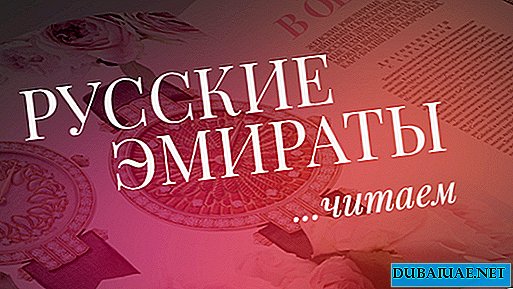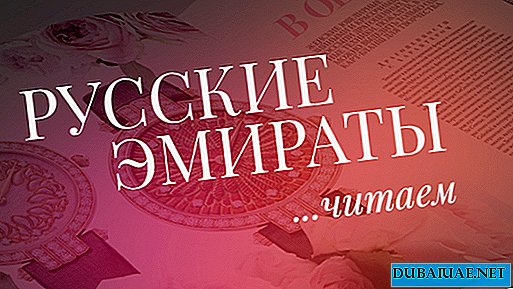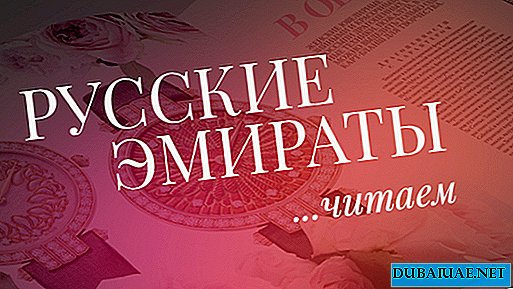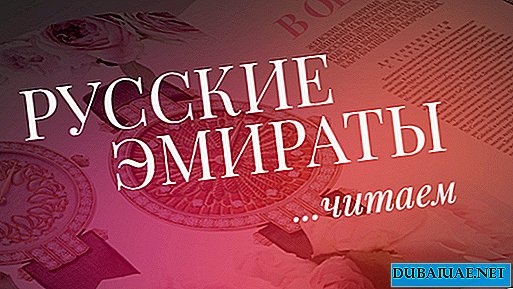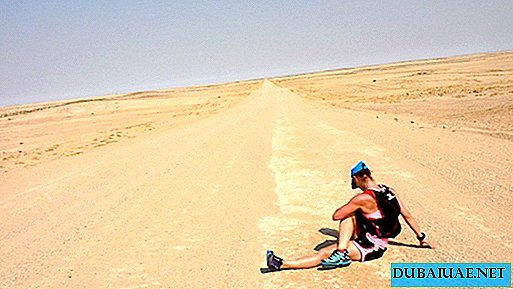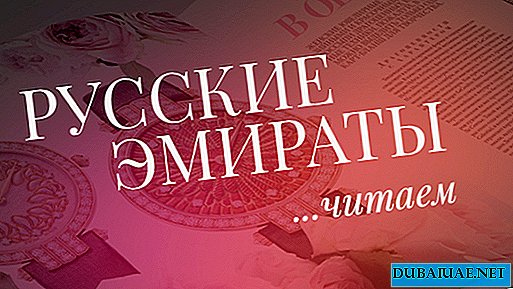There were a lot of green spots on the map. “We will spend the night in the park,” I decided frivolously. And my wife and I first went from Dubai to Al Ain, with only 300 dirhams with us.
Looking at my beard, the taxi driver decided that I was "Muslim", shook my hand and spoke to me in Arabic, as with an old acquaintance. Only halfway to Al-Gubayba Street, he disappointedly found out that I was "Christian" and did not speak Pashtun or Farsi. At the huge, crowded bus station it was not easy to find a bus; however, we managed to take places on time and buy two tickets for 20 dirhams each.

Road
At exactly 14.30 a bus loaded with travelers in Indian and Pakistani robes set off. As befits men, they remained silent; only a young Chinese woman, sitting to the right of the driver, tirelessly popping on her cell phone.
Having left on Ud Metha Street, we saw to the left the reeds and marshy islets of an unusually wide bay. Here she broke off for now, although I knew that in the future she was destined to cross the road along which we were going and continue in an artificial channel to the right. Then, on two sides of the road, groves of deciduous trees began to stretch in a continuous strip; closing his eyes to some botanical details, one would think that you were going, say, from Tver to Vologda.
As a child, I always thought that the desert begins abruptly, so that it can be surrounded by, say, a rope with red flags, stepping over which, a person could say: "My right foot is in the desert, and the left is not there yet." However, the first sea of dunes in my life, lying between Dubai and Al Ain, took shape slowly and gradually. The trees were getting lower, turning step by step into bushes; the distance between them, on the contrary, increased. The imperceptibly emerald woody landscape with yellow bald spots has been replaced by its negativity - a sandy background with green islands of tough grassy plants.
Food underground
I woke up already at the entrance to the city - if you could call it a corridor formed by a row of trees, only occasionally interrupted by small houses. Just in case, I tried to remember the names and landmarks: we drove through the Sheikh Zayed Central Library, Globe Square and some other installation with giant beads falling out of a decent size box.
Soon after a round square with a fountain covered by a road bridge, a bus drove up to the market and began to land the last remaining passengers. The driver assured me that this parking is a local bus station with hourly flights to Dubai.
Stepping on hard ground, the first thing I wanted to do was look at a map of the city in the Abu Dhabi Yellow Pages guide I took with me. However, the wife demanded that we first eat; finally we decided to have lunch and orient ourselves at the same time.
Finding nothing like a cafe near the market, we went down to the underpass, which covered the fountain with a bagel. Constructed, apparently, with the expectation that Al Ain will someday become a bustling metropolis, the transition was striking in its size, worthy of the pavilion of the Moscow metro station. It completely did not correspond to the external landscape, one half of which was occupied by a palm grove, and the other - a large mosque and a scattering of three-story houses with small shops.
At the center of this architectural miracle were flaky tables and laced chairs, inviting Bedouin food lovers. On these tables there were no such excesses as tablecloths, napkins, toothpicks and ashtrays; water, not much different from tap water, was proposed to be poured from a plastic jug into iron glasses. The menu, consisting of only one Indian rice dish called chicken biryani, also looked Spartan. The cook broke 17 dirhams for him - that is, more than the total cost of food on all the tables of this establishment. However, I had to fork out: I was eager to expand the map, and my hungry wife would agree to eat anything.
The food seemed to me too heavy and dense, and, alas, the map did not add anything to my knowledge of Al Ain. There was no market, no bus station, no automobile bridge; that we are still in the center, said only the inscription Palm Plantation. I suggested going upstairs and checking the names of the square and the nearby streets with the names on the map. But here an unpleasant discovery awaited me: in this city for some reason it was not customary to hang up any signs, not to mention such Dubai’s luxury as district maps.
Hedgehogs in the fog
We wandered around the market; made sure that we know where the bus station is; walked around the mosque. Rare passers-by and even more rare cars gave way to us, as apparently they had nowhere to hurry.
“Where are we going now?” - asked the wife; I thought about it. In fact, one could go in any direction, since not one of the nameless streets, groves or squares evoked any desires or associations.
“There,” I finally said, pointing to the street along which, as it seemed to me, we had arrived by bus. - Now let's go there, but actually I want to Oman. But maybe he is far away; then we will find him tomorrow.
“I want to go up the mountain,” said the wife, “there are no snakes.” We spend the night at the top, and in the morning we wash ourselves in a warm spring.
“Let's go,” I said, “and what do we tell the taxi driver?”
It turned out that we both did not know the name of the mountain: my wife relied on my map, and I on the guidebook, which she read before leaving. Thinking about it, we walked under the automobile bridge and headed forward along the left sidewalk of a wide street, no different from the rest. Apparently, this highway was one of the main ones - judging by the size of the sidewalk and the number of shops on the ground floors. All the passers-by were exclusively male; among them there was not a single person of any European appearance.
“This is all wrong,” I said. - We need to remake the area so that it looks like a map.
- Maybe it's easier to change the map? asked the wife timidly, who did not like great shocks.
“No, it’s not easier,” I said, “then each card will have a thousand versions.” After all, people see the same terrain in completely different ways.
For twenty minutes we walked like the prickly heroes of a famous cartoon, having no idea where we were going from and where. Then a sign appeared at the Sana Hotel, at the entrance to which was a fountain and several wooden benches. We sat down to rest; in the middle of the street I saw a sign with its name - the first in two hours.
“Al Gaba is moving to Abu Baker Al Siddiq,” I said tiredly and mechanically opened the card, not even hoping to find these names on it.
Departure to the North
My joy was comparable to the enthusiasm of a sailor who discovered an unknown island. Finally it became clear exactly where we are. A street with wide sidewalks led straight to Oman, and it was very close to the border of the two states.
Perked up, we went in the same direction further. The landscape on both sides consisted mainly of high concrete and iron fences, behind which were gardens of different densities and degrees of wildness. Then, ahead, a wide area overgrown with grass opened, which had five corners along the edges and in Russian, mighty trees in the middle. Behind her, the cars seemed to crawl quite slowly, slowing down near a strange patrol post, which consisted of a tarpaulin canopy and a police car sleeping underneath. In front of the car there was a chair with iron legs, on which sat, pecking, a motionless man in uniform. Just in case, we walked around behind him, stepping over a low iron fence.
“And how do we know that Oman has already begun?” - asked the wife.
“There are other gas stations,” I replied importantly, proud of my knowledge.
My imagination, meanwhile, painted in front of me the great Berlin-Chinese wall, laden with machine-gun towers. Meanwhile, a gas station with the words OmanOil appeared on the left.
In oman
Wanting to make sure that we really crossed the line separating the emirates from the sultanate, I hurried to the first store we met. However, his seller did not seem to suspect the existence of price tags; on the shelves of his "supermarket" the size of a spacious cupboard were adjoining Barbie dolls, car parts, shampoos, kerosene and chocolate of unknown origin. In English, he did not understand a word.
Having bought Snickers, the wife paid the Omani bank note and received the change with the new dirhams. Continuing the experiment, in a nearby store (of the same size and repertoire), I bought apples for dirhams, having received bills with a portrait of the Sultan for delivery. In the twilight of the store, the “ruble” and “two-ruble” Omani papers seemed almost the same, differing only in numbers of 100 and 200 “kopecks”.
Everything indicated that our list of visited countries was replenished with another state. Shocked not so much by this event as by its modest routine, we sat at the plastic table of a street eatery, proudly calling itself a "cafeteria." Tea diluted with milk cost half a dirham and brought back memories of kindergarten.
It is evening; nearby, hens rummaged in the dust and walked around with an important look of a goat. Omani citizens, similar to the characters of García Márquez, slowly walked out onto the porch of their cement huts, lit Indian cigarettes and silently saw off November Thursday.
Continuing our way in the same direction, that is, the north, we came across a hotel, a double room in which cost 300 dirhams. This more than covered our entire capital, and we wandered back to the center of Al Ain in the hope of finding a hospitable bush behind one of the cement or iron fences.
However, before we reached the gas station, a hotel appeared on the other side of the street, resembling a dormitory for students of the Uryupinsky Pedagogical School. The enticing name Al Dhahrah flaunted the entrance.
“Al Dyra,” I read. “Looks like that's exactly what we need.”
The fat Arab behind the counter said that a double room costs 160 dirhams. The amount inspired us, but did not want to sleep yet. We headed back to the center of Al Ain, on the way exploring an abandoned garden. Indeed, from the conversation we still did not understand whether this amount was taken from a couple or a person.

Evening in the center
Alas, the garden was quite inhabited and did not promise privacy. The palm grove near the big mosque seemed much more dense, but the wife was afraid that there were snakes. Just in case, we, passing the bus station, examined the fence surrounding the palm trees, looking into all the gates and cracks. There were trucks making strange noises next to the fort, which was locked at night. Stepping closer, we realized that their captives were shouting — fold goats, goats, rams, lambs and sheep with spaniel faces. Their owners, sleeping side by side on the straw, did not pay any attention to us. However, just in case, I shot animals so that their sellers could not see me.
On the way back to the mosque we took pictures at the monument to the tilted coffee pot; the cup he was pecking pulled on a decent font. On the other side of the road was another fort. Climbing a bridge over the street, my wife saw in the distance a chain of lights rising up and lost in the dark. The resulting silhouette looked like a giant, well-lit, but for some reason unfinished bridge to heaven. I quickly realized that the lights mean the road to the top of the mountain.
Looking down, we saw on the side of the street we needed a crowd of local men, as vast as the May Day demonstration. These people did not move anywhere, only smoked, chewed and talked languidly. Apparently, standing shoulder to shoulder replaces them with an evening walk.
They helpfully parted, letting us go to the gates of the fort; in one of the wings there was a small gate, which I did not fail to get into, thinking little about the consequences.
Old fortress
Inside, a deserted paved courtyard with a square fortress in the middle opened. Her wooden door was not locked; we creaked open it and began to climb one floor after another, lighting our way with a lighter. The layout of all levels was almost the same: each of them was divided into three or four Khrushchev-style compact rooms. We found no furniture or any other items in the premises. Sometimes our fingers felt the warm wood of the window shutters; all the rest of the time under the feet, on the side and on top there was only the material from which the fortress was built - either concrete or cement.
Although the prospect of spending the night in the fortress seemed romantic, we were confused by the fact that the wooden doors of the rooms were much better locked from the outside than from the inside. And this meant that the museum clerk, if there was one, could lock us up early in the morning and calmly go to the police. Although we had no alcohol or drugs or even porn magazines with us, the gendarmes would hardly have approved the use of a public place, that is, a fort museum, for purely personal purposes.
The same applied to the wife’s offer to spend the night on the roof of the fort, pulling up the stairs. I assured her that the museum workers probably have a different one and that even the week we spent in prison will greatly disturb the cat left in Dubai.
Going down and approaching the gate leading back to the street, we saw a group of people heading towards us from a lighted annex. “Police,” I thought, and boldly continued on my way. However, these Indians (apparently living in the fortress) just wanted to open the door for us.
Overnight at the hotel
The street greeted us with "demonstrators" who probably decided to spend the night on it. All attempts to get around them in parallel courtyards and alleys did not succeed: the population density of asphalt was the same everywhere, shoulder to shoulder, and we had to apologize every minute, stepping on someone's slippers or worn sneakers.
Only when we again went out onto the highway with wide sidewalks, we left this human sea and briskly walked along the familiar road past the Sana hotel to the north. On the way to Oman, we penetrated behind another cement fence and, as it should, examined the garden, which belonged to some kind of driving school. However, our favorite glade was never needed: the fat Arab at the hotel desk was satisfied with photocopies of passports and a paper of 200 dirhams, promising to return change in the morning. He gave us a huge key to a small room on the third floor, where a narrow wooden staircase led.
We moved two narrow beds into one wide and, not turning on the huge air conditioner, walled into the wall, just opened the window. Having taken a shower, we had dinner with fruit and juice, bought in a shop across the road, near a gas station and a “cafeteria” with kindergarten tea.
Breakfast
In the morning I tried in vain to get through to the restaurant, whose menu was right there on the nightstand. None of the phones with complex codes answered - perhaps, I just did not know how to call from the hotel. Then we decided to go downstairs and inspect the restaurant on the ground floor, resembling what we noticed when checking in.
To our great surprise, it turned out to be exactly the place where we could not get through. We chose a round table on the sunlit veranda. Its wooden columns, wattle and wire roofs were entwined with ivy, which finally drowned out the sounds of cars that occasionally drove up to the gas station. The waiter, who spoke almost no English, explained that of the entire multi-page menu, only scrambled eggs are served in the morning. He apologized and tried his best to cheer us up. From the fifth time he understood our story about 40 dirhams, he brought them, taking it from a girl in a black cloak, now sitting at the counter instead of an Arab.
The fried eggs turned out to be excellent, and the meat was freshest. Judging by the waiting time, the lamb was caught and cooked specially for our order.While we were eating, behind an ivy-covered fence, two boys of about five to seven argued over which of them was not “weak” to approach a rare European in these places. Finally, the youngest of them ran to our table, overcoming his fear of being bitten.
“Salaam alaikum,” he said.
“Aide mubarak,” I answered and smiled.
This ended the conversation; the young Omani boldly turned his back to us and ran away, trying not to do it very quickly so as not to drop his dignity. Having paid, we went upstairs to pick up things, barely dispersing on a narrow staircase with a girl in a cloak carrying a mountain of pillows down. She returned the copies of the documents to us, having hardly torn off a thick notebook, where yesterday the Arab nailed them with large iron clips.
We headed south to the center of Al Ain, looking around with farewell eyes to a hotel with a serene veranda, chickens and goats, a gas station with benches and a "cafeteria", a sleepy policeman in a high chair, an abandoned garden on the left and a driving school on the right.
By daylight
Palm grove was not a continuous wild forest, as it seemed to us at night. Rather, it could be compared with gardening: small private plots with cement houses of the owners were separated from each other by a picturesque stone fence in human height, built using the technology of the Egyptian pharaohs. Garages of the houses overlook the cobblestone paths that crossed the grove in all directions.
Having removed the red kitten from the tree, we left the grove and again visited the bleating mobile zoo. Now the owners of long-eared animals did not sleep, and vied with each other offering us to film their pets. Nearby was a small fort, where we could not get in the evening; one of its buildings housed a museum.
Having paid for two dirham tickets, we saw a lot of old coins, jewelry, shards, tools and copies. The group of mannequins behind the glass probably represented the military council of the elders: shaking their guns and coffee pots, long-bearded dzhigits in dressing gowns sat on pillows, ate dates, played on a plucked instrument and stirred the fire in the hearth. Of all the exhibits, I was most impressed with the camel shoulder blades, which were used forty years ago as information carriers.
In search of a cafe, we reached the end of Zayed bin Sultan Street, enveloping the fort. In her last house we were offered fruit and tea with milk; further south, the urban landscape to the right of the road turned into thickets of palm trees, and to the left was replaced by wastelands and vegetable gardens. Not seeing anything tempting in this, I decided to return to the center, but my wife, on the contrary, wanted to get away from civilization as far as possible.

Face to nature
Continuing to go south, we saw a grand bridge ahead, hung with portraits of the sheikhs; Behind it, the Hilton Hotel towered over the crowns of trees. Under the bridge, however, nothing shone or splashed. Going down to the shore, we realized that the river had apparently dried up a long time ago - the bottom managed to grow with trees and bushes. We entered a deserted channel and headed west, describing a ring around a palm grove.
A walk along an endless sandy path the width of a football field would have seemed monotonous, if not for the coast paved with stone: then flat, then steep, they converged and diverged, suddenly turning and giving us new impressions: either a collection of uprooted stumps, then a carriage stolen from the supermarket, then the remains of a camel eaten by someone.
In the place where the riverbed branched, we climbed a stone rock to look around and understand where to go next. The fence surrounding her did not stop us, but rather provoked me so that I climbed the ridge in one fell swoop. Seeing a steep opposite slope in front of me, I decided that I probably did not want to be a climber - and then, turning back, I was horrified to realize that the surface I climbed on was like two drops of water. I’m all part of Fyodor’s father but he didn’t share it: fear relocated curiosity. I wondered why my wife’s voice suddenly fell silent, and her sandals swayed on a saxaul, growing from a stone crack halfway to the top of the rock.
Everything turned out to be simple: she clambered desperately after me, trying not to look down, and took off her shoes as ballast that prevented him from moving. With the speed of Suvorov, who got onto the skis, I quietly crawled down, dragging everything I needed, and soon not only me, but my wife and sandals, and all our things rolled down to the fence, which, as I understand it, was not necessary to climb.
Realizing that I already had enough impressions, I decided to get out of the river bed to the shore. Sitting under the clouds, I managed to understand that of her two sleeves, we need the right one. Having reached the next automobile bridge crossing a dried river, we climbed up and headed to the city center. My attention soon attracted a sand-colored structure that resembled the bottom of a nested doll cut by zigzag scissors.
Sand Fort
This museum, comparable in size to the Peter and Paul Fortress, consisted of many palaces, houses and outbuildings with a height of three to four floors, interconnected by galleries, stairs and passages. Each building had its own face - despite the fact that they were all built in the same exotic style, reminiscent of the scenery for the adaptation of "Aelita".
Rejoiced at the fact that all the countless rooms were open, I began to scurry down - up and left and right, soon finding them completely identical. Men's chambers, differing only in size, were furnished with coffee pots, daggers, pillows, hookahs and rifles hanging on the walls. In all the women's rooms there were wooden beds with thin high legs, as well as wooden chests of drawers with a mirror in the middle.
The main men's room, covered with a red carpet, looked solemn and elegant, like a throne room. On its walls hung paintings and photographs within; however, I did not dare to consider them, because for this I would have to either stain the carpet or push the visitors in black.
Between the palaces there were several ponds connected by canals and paved with large stones of the same brick color as the outer walls of the fortress. The shores of these reservoirs, planted with short grass, were decorated with benches and miniature bridges. This quiet splendor was broken only by a huge empty tent of unknown destination, which stood in the middle of the fort, and an antediluvian car of one of the first leaders of the UAE.
Home
After eating shawarma, we returned to the bus station, finally closing the ring around the palm plantation. The outgoing bus was almost full, so before taking the line for tickets sold in a small cement booth, we took the last two empty seats.
The bus started; in the twilight surrounding it, I managed to discern that the beads in the giant box are pearls that glow in the dark. In front of us were two symmetrical couples, consisting of Indians in European clothes and their wives in black cloaks. The hands of both wives were painted with henna. In one of the couples was a little swirling girl; armed with a gel pen, she diligently painted her father's hands, deciding that he was no less worthy of decoration than his mother. I agreed with the girl, and when her pen was empty, I handed her mine.
At home, we found another map, much more detailed than taken on a trip. However, neither she nor the guide explained why the most interesting impressions usually lie in wait where you least expect them.
Ivan Sheiko-Little



